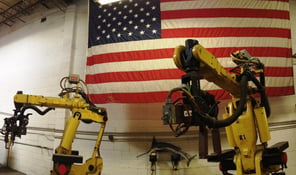 Back in 1998, when Drew Greenblatt first bought Marlin Steel from its previous owner, the company was known as the “King of the Bagel Baskets.” The company earned this title for specializing in the production of cheap commodity baskets for displaying bagels.
Back in 1998, when Drew Greenblatt first bought Marlin Steel from its previous owner, the company was known as the “King of the Bagel Baskets.” The company earned this title for specializing in the production of cheap commodity baskets for displaying bagels.
At the time, business was strong and steady. The production standards for these baskets didn’t need to be especially high, making production easy. Bagel stores were everywhere, and the need for baskets was strong. There was competition, yes, but Marlin’s low price point and the voracious demand for baskets kept the orders coming.
Things Change
However, within five years of Marlin Steel’s acquisition, the situation changed drastically.
First, the Atkins diet demonized the consumption of carbs, driving many bagel stores out of business. This caused the once-constant demand for baskets to dry up almost overnight, as there were now only a fraction of the number of bagel stores still open for business and in need of bagel baskets.
Second, Chinese companies started to muscle in on the market with ultra-cheap baskets. These baskets were being sold to companies for less than what it would cost an American company to buy the steel to make them.
The result was a near-total loss of new orders, causing Marlin to hemorrhage money. For a time, it looked like Marlin’s Baltimore-based factory might have to shut its doors for good. Then, things changed again when Marlin received a fateful call.
Adapting by Gearing Up Rather Than Backing Down
While the loss of Marlin’s core business was a devastating blow, it would not be a fatal one. In fact, this loss eventually spurred the company into making a major change, one that would drive its success going forward.
The catalyst for this change was a phone call from a Boeing engineer who needed 20 portable wire baskets to hold delicate airplane parts through their finishing process. This order was different from the old bagel basket orders that Marlin was used to in several ways:
- Timeliness. The engineer needed the baskets to be done ASAP to meet his own production schedule, so time to delivery was a much bigger factor than it was for Marlin’s usual bagel basket orders.
- Precision. Aircraft parts are very delicate, and the baskets had to meet exacting tolerances or they wouldn’t work. Up to this point, Marlin’s workers were used to making imprecise bagel baskets where a variance of several inches in the basket dimensions wouldn’t make a difference. Here, the measurements had to be precise to the millimeter.
- Pricing. When confronted with the time and precision challenges, Marlin’s CEO quoted a price to the Boeing engineer that was double the amount Marlin charged for commodity bagel baskets. The engineer didn’t flinch, simply saying “whatever, no problem” when confronted with a $24 price point. This was the key difference for Marlin.
Meeting the Boeing engineer’s needs for timeliness and precision required some major changes in the way that Marlin worked. The transition was not without difficulty, as filling this basket order called for things that Marlin Steel had never dealt with before.
Despite the difficulty, Marlin was able to fill the order, and had discovered a new niche that it could use to drive business forward: high-quality, precision baskets for manufacturing applications.
To better meet this niche, Marlin Steel began investing heavily in manufacturing automation equipment and employee training. Gearing up and spending money at a time when the company was losing customers fast was a gamble, but doing nothing would have just meant a slow death for the company.
Beating Cheaper Chinese Competitors
As difficult as the process of evolving from a basic commodity bagel basket maker into a top-notch crafter of precision engineering baskets was, the rewards were well worth the effort for Marlin Steel.
One of the biggest rewards was being able to move out of having to compete solely on price with Chinese companies who enjoyed the advantage of being government-subsidized and not having to actually turn a profit to survive. Instead, Marlin was now serving clients who couldn’t afford the months-long wait for overseas basket orders and the production inefficiencies caused by poorly-made wire baskets.
In essence, Marlin Steel could now ignore its Chinese competitors, since Marlin now served a different market, one that was focused on timeliness and quality of results, not cost of product. In fact, Marlin exports high-quality baskets to some Chinese companies.
Now, Marlin’s sales are six times what they were in 2003, the head count has been doubled, and the average wage for a Marlin Steel employee is four times greater what it once was.
So, when faced with Chinese competition, Marlin Steel didn’t slow down, it got leaner, faster, and stronger to overcome the challenge. A little American ingenuity and hard work kept this company open and made it stronger than ever.



.gif)


